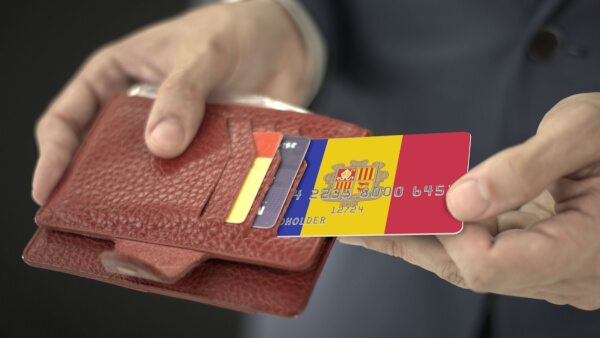How to open a UK bank account online in 2025
Check out our essential guide on how to open a bank account online, including bank types, required documents, fees, and more.

Currency conversion isn’t cheap. However you choose to exchange your money, there are costs and fees to pay.
You’ll know all about the costs of currency exchange if you travel frequently, have financial commitments overseas, or work as a freelancer or entrepreneur and invoice in euros. If that’s your situation, then you might be considering opening a euro bank account to limit the costs of currency exchange. Most high street banks in the UK offer euro-denominated bank accounts but it’s important to note that they come with different terms, conditions, and costs, than the sterling accounts that you might be familiar with.
An alternative, if you want to dodge the costs associated with traditional euro accounts, is to try a specialist provider like Wise. It pays to do your research, so you get the best deal. Make sure you look at both the familiar banks, and specialist services such as Wise, so you can see how they measure up.
To get you started, here’s the lowdown on how to open an HSBC euro bank account.
A euro bank account from HSBC isn’t much different to your regular bank account - except that it operates in euro currency, instead of pounds sterling. It’s intended for people who travel often or have financial commitments in the eurozone - for example, if you own a holiday home there, and need to pay the mortgage in euros.1
You can open an HSBC euro bank account if you’re over 18 years old, a resident in the United Kingdom and already have a regular sterling account with them. Also, the account you already hold must not be a student account or basic bank account.2
If the restrictions on opening an HSBC euro account mean that it’s not suitable for you, then you could choose instead to open a euro account with Wise. You might even be better off.
The Wise euro account is as flexible as you are. In fact, as well as holding your money in euros, you can also hold dozens of different currencies in the same account. That’s why you’ll also hear this account called the multi-currency account.
It’s easy to check your balance across currencies at a glance, and switch between them, using the mid-market exchange rate, and with only a small transparent fee for each transaction. Because the mid-market rate is used, you know you’re getting a fair deal.
The mid-market rate is the only real exchange rate, but it’s not always the one used by banks and money exchange services. Instead, they might wrap up their profit in the exchange rate they offer, hiding the true costs of the transaction. With Wise, everything is up front, and there are no nasty, hidden surprises.
HSBC says their euro bank account is perfect for frequent travellers and people with financial commitments abroad.1 And it’s true that a euro account is pretty much essential if you’re an expat and live full time in a country that uses euros.
But having a euro bank account can also be a good idea if you’re a freelancer or entrepreneur and get paid or pay suppliers in euros - even if you live in the UK most of the time.
Having a euro-denominated bank account has a few advantages - including:
Multi-currency accounts from Wise are strictly regulated, just like most British high street banks.
And, as well as all the great points above, a Wise multi-currency account also offers the following benefits which high street euro bank accounts might not:
The multicurrency account from Wise isn’t a bank account. But it has many of the benefits of a more traditional account, and some extras you won’t find on the high street, as well.
It’s important to know that the costs and fees attached to an HSBC euro account won’t be exactly the same as those which apply to your regular sterling account.
Here are some of the costs you need to understand if you’re considering an HSBC euro account. For the full details, make sure to contact an HSBC representative:
| Service required | HSBC euro account fee1 |
|---|---|
| Paying out of your account | To another HSBC account - freeVarious fees are added if you’re making a payment to a non-HSBC account, depending on the currency you’re paying out in, and also whether you make the payment online, by telephone or in a branch. Here are some examples:Euro payments made online EUR6, made in branch or on the telephone, EUR12USD payments made online USD6, made in branch or on the telephone, USD14AUD payments made online AUD8, made in branch or on the telephone, AUD18 |
| Electronic payments into your account | Free |
| Cheque payments into your account | Various fees are added, depending on the currency you’re paying in, and also the value of the cheque. Here are some examples:Euro cheques - EUR8-EUR83 fee depending on the amountUSD cheques - USD9-USD93 depending on the amountAUD cheques - AUD12 - AUD121 depending on the amount |
| Collection charge per cheque | Various fees are added, depending on the currency. Here are some examples:Euro cheques - EUR39USD cheques - USD44AUD cheques - AUD57 |
| Miscellaneous charges for cheques | There are also fees added for return and for pension cheques, which vary by currency |
As part of their terms and conditions, HSBC warns about potential extra charges in addition to those detailed above, when making international payments. Here’s what they say:
For International Payments, the recipient's bank, and any foreign bank we may use to send the payment, may also make a charge. This is outside HSBC's control. 1
That’s because international payments processed by traditional banks are often made via the SWIFT network. That’s where several banks work together to process a single international transaction - and each of them can add their own fees and charges. As you might guess - that can get pricey.
If you choose a euro account from Wise, instead, the charges are much easier to digest. They are as follows:
| Service required | Wise euro account fee |
|---|---|
| Account opening | Free |
| Adding money to your Wise euro account | Free |
| Receiving money into your Wise euro account | Free |
| Setting up local bank details for the euro area, UK, US or Australia | Free |
| Converting money to other currencies | Low and transparent fees that vary depending on the currencies - carried out at the real exchange rate |
| Withdrawing cash to a linked bank account | Small, fixed fee, depending on the currency you’re withdrawing |
You can open an HSBC euro bank account in the UK, online, on the telephone or by visiting your local HSBC branch in person.3 The easiest way is to log into online banking or give the bank a call. There are different phone numbers to call depending on which account type you already hold with HSBC, and whether or not you’re currently in the UK.3
If you plan on opening your account in branch, then it’s worth calling ahead to check the documents needed to open a euro account with HSBC. These could vary depending on your circumstances, but you can expect to need the following:3
Whether you’re a frequent traveller, own property overseas, or get paid in euros for your freelance work, you’ll want to cut down on the fees you pay for exchanging money from sterling to euros. You have several choices. You could choose to open a euro bank account with a UK high street bank like HSBC, which is familiar even if the costs are relatively high. However, it’s worth checking the restrictions on these type of accounts, as you must already have a sterling account with HSBC and be considered a resident in the UK to open this account type.
Whatever you decide to do, compare the costs of a euro bank account from HSBC, with a multi-currency account from Wise first, to see which offers you the best deal.
Sources:
*Please see terms of use and product availability for your region or visit Wise fees and pricing for the most up to date pricing and fee information.
This publication is provided for general information purposes and does not constitute legal, tax or other professional advice from Wise Payments Limited or its subsidiaries and its affiliates, and it is not intended as a substitute for obtaining advice from a financial advisor or any other professional.
We make no representations, warranties or guarantees, whether expressed or implied, that the content in the publication is accurate, complete or up to date.

Check out our essential guide on how to open a bank account online, including bank types, required documents, fees, and more.

Check out our essential guide on how to open a bank account in Jersey as a British expat, including documents, fees, banks and much more.

Check out our essential guide on how to open a bank account in Monaco as a British expat, including documents, fees, banks and much more.

Check out our essential guide on how to open a bank account in Andorra as a British expat, including documents, fees, banks and much more.

Read our rundown of the best Nationwide USD account alternatives available in the UK, including HSBC, Lloyds, Wise, Barclays, Revolut and more.

Read our essential guide to the Revolut USD Account, including info on features, fees, rates, limits and how to apply.